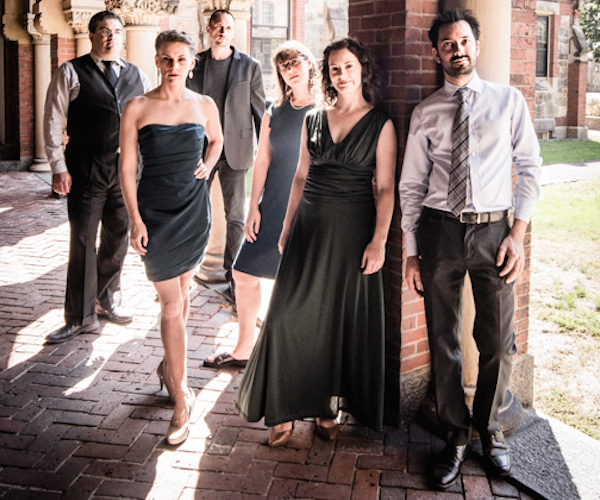Concert Review: Grand Harmonie’s Gods and Mortals
Grand Harmonie’s best playing of the day was edgy: a little rough around the edges, yes, but, above all, punchy and vibrant.

Members of Grand Harmonie. Photo: Sarah Paysnick.
By Jonathan Blumhofer
Grand Harmonie’s (GH) fifth season continued Sunday afternoon at Brookline’s United Parish with an all-Mozart program titled Gods and Mortals. Three pieces played without a conductor – the Serenata Notturna, Fifth Violin Concerto, and Symphony no. 41 (Jupiter) – made up the afternoon.
The Symphony, which closed the concert, offered some of GH’s best playing of the day: edgy and a little rough around the edges, yes, but, above all, punchy and vibrant. It was a treat, for instance, to hear the opening chords of the first movements played so dynamically that they positively bounced. And also to experience the interior movements realized with such natural momentum and flow.
In these moments – and several in the finale, too – GH’s was a downright stylish performance. It was nimble and dance-like, articulated with care. During the big, dramatic climaxes, especially, the approach paid off. The end of the first movement was thrilling. The second’s melancholy development section seethed with intensity. And those great, magical bars in the finale’s coda where all that movement’s materials are repurposed into a fugue brought chills.
Throughout, textures in this most vigorously contrapuntal of 18th-century symphonies were clearly delineated, even if they weren’t always shaped with the same precision. Sure, a conductor might have helped rectify that problem – but that also might have intruded somewhat in the lively interaction between the ensemble’s players who, in this Symphony, were more a big chamber ensemble than anything else.
A slightly smaller group accompanied guest artist Cynthia Roberts in the Violin Concerto no. 5 just before intermission. Roberts is a big name in early-music circles and a fine violinist to boot. That this “Turkish” Concerto didn’t quite gel was perhaps less her fault than the space’s, which tended to subsume her sound in that of her backing band. Still, Roberts’ accounts of the Concerto’s cadenzas were terrific: fiery and thoughtful. And her realization of the lively “Turkish” music in the finale bristled with energy.
GH delivered a sturdy accompaniment. They were at their finest in a flowing performance of the Concerto’s great slow movement, here a beautiful, wordless aria passed back and forth between solo violin and orchestra.
Before the Concerto came a whimsical reading of the Serenata. This piece is, almost by instrumentation alone – let alone musical content – one of Mozart’s goofiest. Parts of it work as a concerto grosso, with a pair of violins, viola, and bass as the ripieno; all of it’s chock full of Mozart’s (late-adolescent) attitude and humor.
Sunday’s performance ably captured that spirit throughout the Serenata’s three movements. From the stout opening of the first movement with its martial tattoos to the graceful minuet and through the cheeky rondo-finale, GH’s interpretation was smart and playful.
Jonathan Hess pretty much stole the show with his dramatic timpani solo in the finale (where else do you find something like that in Classical repertoire?), but violinists Roberts and Emily Dahl Irons, violist Anna Griffis, and contrabassist Nathan Varga each acquitted their solos characterfully, too.
If the ensemble’s sound in the Serenata was a bit raw, it perhaps reflected the chilly setting: lovely a space as the United Parish is, the interior was uncomfortably cool on Sunday. This, in turn, affected the strings’ tuning, which had to be adjusted pretty much on a movement-to-movement basis.
At least the next opportunity to hear Grand Harmonie should be in cozier environs: their new recording of the soundtrack to Peter Schaeffer’s Amadeus will accompany Moonbox Production’s presentation of that play at the Boston Center for the Arts beginning later this month (November 25 through December 17).
Jonathan Blumhofer is a composer and violist who has been active in the greater Boston area since 2004. His music has received numerous awards and been performed by various ensembles, including the American Composers Orchestra, Kiev Philharmonic, Camerata Chicago, Xanthos Ensemble, and Juventas New Music Group. Since receiving his doctorate from Boston University in 2010, Jon has taught at Clark University, Worcester Polytechnic Institute, and online for the University of Phoenix, in addition to writing music criticism for the Worcester Telegram & Gazette.
Tagged: Gods and Mortals, Kristin Olsen, Mount Sinai Concerts for Patients Grand Harmonie
